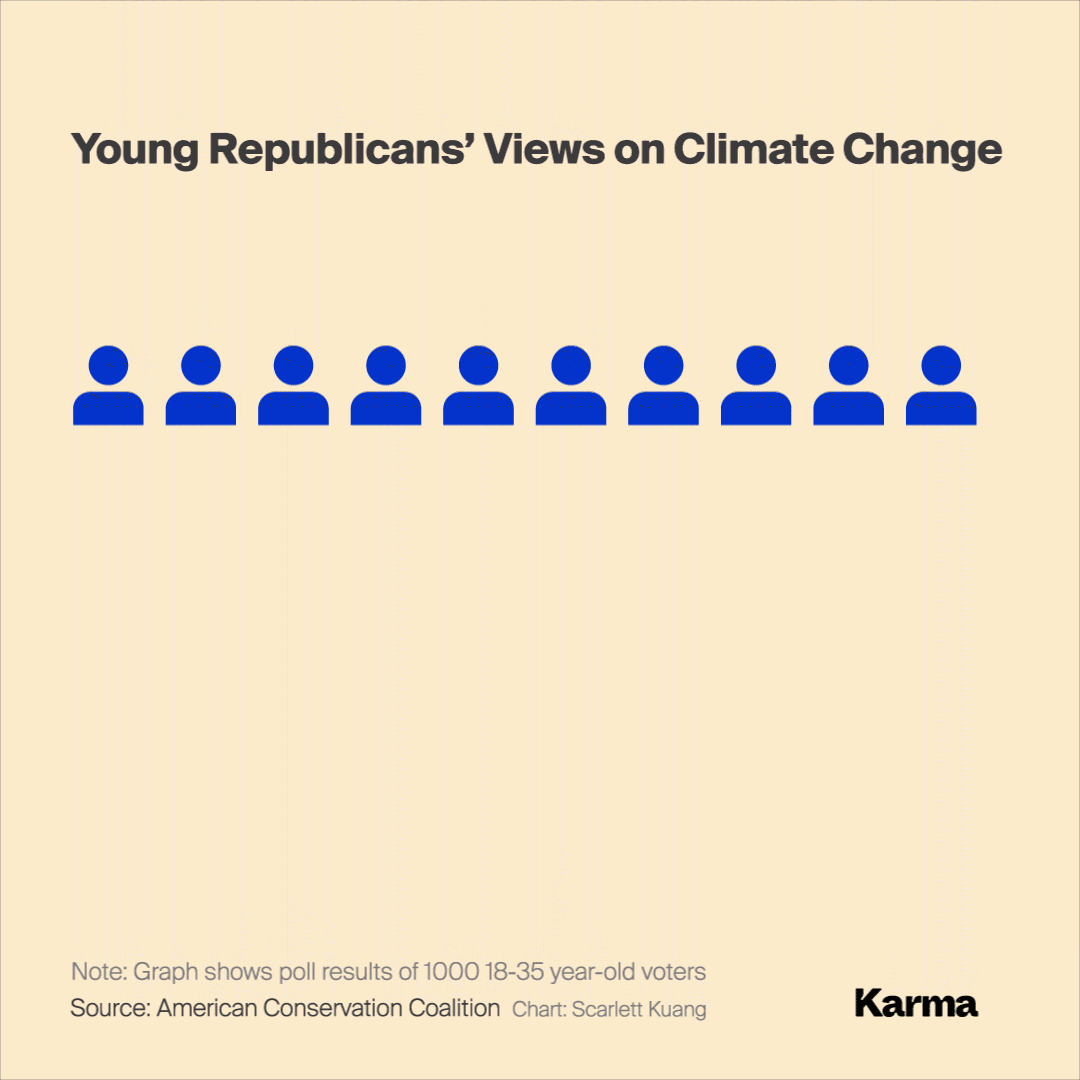- Growing number of conservatives, especially millennials, joining a concerted effort to battle climate change
- Climate-change-fighting conservatives plan to support investment in renewable energy efforts, including solar and wind power, while also encouraging energy innovations.
- Democratic groups question whether the new movement is genuine or part of an election-year effort to win over younger voters
Climate change is gearing up to be a political hot topic once again, with a flurry of new proposals expected before election season even as the COVID-19 pandemic batters the economy and puts in doubt the campaign calendar.
This year’s debate comes with a twist: both sides of the aisle will be fighting to be the party of the environment. For perhaps the first time since Nancy Pelosi and Newt Gingrich sat on a loveseat in 2008 and proclaimed “We Can Solve It” for a climate-change ad, Republicans are ready to jump full force into the climate change debate.
“I think there’s definitely a hunger out there with conservatives and Republicans to get beyond fighting over the science and to talk about solutions,” Drew Bond, co-founder of Conservative Coalition for Climate Solutions, an advocacy group for conservative approaches to aiding the environment that launched earlier this month. “Conservatives, by and large, do believe that we need to be proactive and not reactive. We need to be on offense, not defense, on climate solutions.”
Conservative Coalition for Climate Solutions — C3 Solutions, for short — joins a growing number of right-of-center groups ready to challenge proponents of the Green New Deal with their own agenda of plans to battle the climate crisis.
Bond says his group will work with the White House on reforming the National Environmental Policy Act (NEPA), which opponents say hurts all sorts of projects including those from impact investor-backed renewable energy companies.
“I’ve experienced this as a solar developer — the challenges of NEPA and the sheer time and money that it takes and the delays that it imposes on projects,” he said. “Here’s a well-intended law to protect the environment that’s actually getting away from protecting the environment and clean energy innovation.”
C3 Solutions will also support House Minority Leader Kevin McCarthy’s slate of environmental proposals that was expected earlier this year but delayed by the arrival of the coronavirus. Bond said he would also want to advocate that the coming stimulus package be used to help create jobs that could help fight climate change.
“What we really want to happen is for conservatives and Republicans to come up with a comprehensive, cohesive plan that embraces innovation and also streamlines regulation,” Bond says. “It also needs to take into account a responsible approach to spending, with the recognition that you really do have to invest in energy innovation.”
To accomplish that, Bond and his C3 Solutions co-founder John Hart realized that conservatives needed to do a better job of explaining how their values could fight climate change.
“there’s definitely a hunger out there with conservatives and Republicans to get beyond fighting over the science and to talk about solutions.”
Hart says the idea hit him about two years ago, when he invited Bond out to his Harpers Ferry, Maryland, farm.
Hart and Bond had been friends for decades, since they worked in the U.S. Senate together, with Hart eventually becoming Republican Sen. Tom Coburn’s longtime communications manager and Bond eventually becoming chief of staff at the Heritage Foundation. They decided to meet to catch up, but also because Hart was thinking about putting a solar array from Bond’s new company, Powerfield Energy, on the 62-acre farm.
“We were kind of laughing about it — Drew, the solar company CEO, who wanted to put solar on my sustainable farm,” Hart says. “We made a comment like, ‘If only our conservative and progressive friends could see us now.’”
But that chuckle turned into an epiphany. “We realized that we’re not outliers,” Hart told Karma. “Conservatives, by and large, care about the environment. They’re conservationists. They’re very skeptical of the virtue signaling, I think, on the left. But it doesn’t mean they’re not virtuous.”
Millennial leadership on climate change
The growing number of conservative groups ready to now speak out against climate change reflects the views of younger Americans, especially millennials, regardless of their political affiliation.
The Trump Administration has taken a number of actions seen as potentially hurting the environment, as chronicled by Columbia University’s Sabin Center for Climate Change Law and other groups. President Trump’s high-profile steps, including withdrawing from the Paris climate agreement and trying to prevent California from issuing its own emissions rules, as well as his off-hand comments like calling the issue a “hoax,” haven’t done much to change the majority of people’s minds.
A Pew Research Center poll released in April found that 60% of Americans thought that climate change was a major threat to the country, including 88% of the Democrats and left-leaning independents surveyed. The American Enterprise Institute found in a survey last year that more Republicans disagree with their party on climate change than any other issue. And according to a recent poll of voters 18-35 done by the American Conservation Coalition, 90% of independents and 77% of right-leaning respondents said the climate change issue was important to them.

Hart credits conservative millennials for convincing older generations of the importance of speaking out against climate change. “I think the millennial conservatives have shown a lot of leadership and vision,” Hart told Karma.
However, many environmental and left-leaning groups question the timing and the motives of this new movement.
“I think what you’re seeing these groups responding to is the reality that climate change is really growing as a concern, especially for younger voters, but really for voters of all age groups,” Ari Drennen, press secretary for the Center for American Progress’ Energy and Environment War Room. “What I’m less clear on is whether they’re actually offering the kinds of solutions that we need to face the challenge or whether this is simply another well-funded PR effort, trying to paper over some of their electoral weaknesses with groups that they know that they need to win.”
Solving climate change ‘gridlock’
Nevertheless, conservative millennial groups like the American Conservation Coalition say they are ready to seize the moment.
In April, the group announced the American Climate Contract, which proposes using energy innovation, natural solutions such as reforestation and wetland restoration, and modernized infrastructure to battle greenhouse gas emissions.
“Sound science demonstrates that there is an undeniable link between human activity, particularly greenhouse gas emissions, and climate change,” reads the contract.
Quillan Robinson, the American Conservation Coalition’s vice president of government affairs, said his group wants to work toward solving climate change as much as anyone else.
“You don’t have to sacrifice your conservative principles in order to be a champion on the issue of climate change.”
“The fact that there hasn’t been this bipartisan conversation with lots of different ideas from different ideologies is one of the reasons that we’ve really seen gridlock on the issue of climate change,” Robinson, 24, told Karma. “In the wake of the Green New Deal…we need to articulate a vision for climate action and success in the fight against climate change that is grounded in the principles of free markets, of limited government and relies on business innovation.”
Many climate-change-fighting conservatives say they are seeing movement from Republican leadership, including President Trump, on the issue.
Robinson pointed to the federal approval last week of the $1 billion Gemini Solar Project in Nevada, which would become the largest solar farm in the United States, as a sign of progress.
“That’s an example of the kind of things that ties the president’s agenda of deregulation — and streamlining regulation in order for projects to get up and going to environmental reform,” he says. “That is our core message: You don’t have to sacrifice your conservative principles in order to be a champion on the issue of climate change.”
And in a presidential election year, these conservative groups are hoping that their message to Republican party leaders is heard and included in their re-election efforts.
“He has not been as strong on the issue as we’d like him to be,” Robinson said of Trump. “And honestly, he is not representative of where the future of the party is on climate change. I think that there’s a moral case and also a very strong political case for him to talk about the issue, to recognize its importance and champion policies that will move us forward on the issue.”
‘Going to be a robust debate’
Robinson says most conservatives are willing to support common-sense climate change solutions, regardless of their political affiliation or whether they are incremental or far-reaching. He says waiting for a “silver-bullet solution” is wasting precious time.
“Waiting for a President Bernie Sanders in order to act on climate doesn’t seem like the responsible thing to do. Right?” Robinson says. “If climate is so urgent, and I believe it is, we should be focusing on things that are better for lowering emissions today.”
C3 Solutions believes that investment, from the public and private sectors, should go to good ideas across the energy spectrum. “I don’t think the answer is another top-down way of approaching it,” Hart says. “It’s going to be a celebration of innovators, telling the stories of local people solving the problem.”
The first stereotype that these groups want to eliminate is that conservatives don’t care about the environment. And they want their vision of potential climate-change solutions to be heard.
“I’m really hopeful that there’s going to be a robust debate among conservatives and liberals going forward over one of the best solutions,” Bond says, adding that picking winners by offering tax credits to some industries and not others hurts the chances of finding a solution. “I would rather see a technology-neutral approach to the way that we incentivize energy and energy innovation.”
Left-leaning groups are certainly ready for that debate.
“What we don’t need to be doing is providing bailouts for big oil, which has already benefited substantially under this administration,” says Center for American Progress’ Drennen, though she wants support for workers in all sectors. “We don’t need to be providing bailouts for coal executives. We really need to be thinking about the kinds of investments we’re making in our energy sector and what we want that to look like.”
Photo by Samuel Corum/Getty Images






















